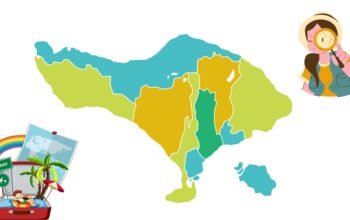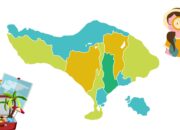Understanding Bali Belly and Its Causes
For those planning a trip to Bali or already on the Island of the Gods, have you ever heard the term “Bali Belly”? This isn’t a traditional food or tourist destination, but a popular name for a stomach upset that is quite common among foreign tourists vacationing in Bali. Although it sounds mild, if not handled properly, Bali Belly can ruin your holiday agenda.
Definition of Bali Belly
Bali Belly is an unofficial term used to describe digestive upset or stomach ache commonly experienced by tourists new to Bali. Medically, this condition is known as gastroenteritis, which is an inflammation of the digestive tract causing nausea, vomiting, stomach pain, bloating, and diarrhea. This condition generally lasts a few days, but it significantly disrupts holiday activities as the body feels weak, uncomfortable, and sometimes accompanied by a mild fever. The name “Bali Belly” emerged because such cases are quite common among tourists in Bali, although it can actually occur in various other tropical tourist destinations.
Why Does Bali Belly Occur During a Holiday in Bali?
There are several reasons why tourists are more susceptible to Bali Belly when they first arrive or during their holiday in Bali:
- Adaptation to a new environment The bodies of tourists, especially those from colder climates or with different hygiene standards, need time to adapt to tropical conditions like in Bali. Changes in temperature, humidity, and types of food can trigger digestive problems.
- Differences in local microorganisms Our digestive system is accustomed to the microbes we encounter daily in our place of residence. Once in a new environment, such as Bali, the body may encounter bacteria or viruses it has not encountered before. This bodily response to new things is what triggers Bali Belly symptoms.
- Consumption of unsterilized food or drinks Although many eateries in Bali are hygienic, there is also the possibility of tourists trying street food or drinks with ice cubes that may not use boiled water. This can be one of the main triggers for Bali Belly.
Causes of Bali Belly
Generally, Bali Belly is caused by the entry of “foreign” microorganisms into the body, especially through contaminated food or drinks. Here are some of the main causes:
- Bacteria such as E. coli, Salmonella, or Campylobacter These bacteria can enter through undercooked food or unclean eating utensils.
- Viruses, such as Norovirus or Rotavirus Can spread through contact with contaminated surfaces or unwashed hands before eating.
- Unsterilized drinking water Consuming water directly from the tap, drinks with ice cubes made from raw water, or fruits washed with unboiled water can be a trigger.
- Drastic changes in eating habits Trying spicy or exotic foods that have never been consumed before can also shock the digestive system, especially if you are not used to them.
- Lack of hand hygiene Not washing hands before eating or after using the toilet can increase the risk of infection.
Is Bali Belly Contagious?
Bali Belly can be transmitted to others, but not all Bali Belly is transmissible; this depends on the cause of the Bali Belly itself. If Bali Belly is caused by bacteria or viruses, then there is a possibility that the disease is contagious, especially through:
- Direct contact with sufferers (e.g., sharing eating utensils)
- Contact with contaminated surfaces (e.g., door handles, dining tables)
- Lack of hygiene when preparing food
However, if the stomach upset is caused by changes in diet or the body’s reaction to new foods, then it is not contagious. To prevent transmission, it is important to maintain hand hygiene, use personal eating utensils, and avoid consuming suspicious food.
About Symptoms and Diagnosis of Bali Belly
A holiday in Bali is indeed enjoyable—beautiful beaches, delicious food, and charming culture. But amidst the euphoria, there is one common problem that often overwhelms tourists: Bali Belly. After previously discussing what Bali Belly is and its causes, now we will thoroughly explore its symptoms, how long it usually lasts, and how to differentiate it from ordinary food poisoning.
Symptoms of Bali Belly
Bali Belly symptoms generally appear suddenly and can make the body feel weak in a short time. Here are the most frequently felt signs:
- Sudden and Frequent Diarrhea This is the main symptom. It is usually accompanied by stomach cramps and a constant urge to defecate. The stool consistency can be very watery, even more than 5 times a day.
- Cramps and Pain in the Abdomen The stomach feels twisted, sometimes accompanied by a burning sensation in the lower abdomen. This sensation can appear continuously or come in waves.
- Nausea and Vomiting This condition is usually caused by the body trying to expel foreign substances or microorganisms that are considered harmful.
- Mild Fever Some people also experience an increase in body temperature. Although not high, this fever indicates that the immune system is working.
- Loss of Appetite Nausea and discomfort in the stomach make food unappetizing.
- Fatigue and Weakness Because the body loses fluids through diarrhea and vomiting, you can feel very weak, lethargic, and even have difficulty with activities.
- Bloating and Frequent Flatulence A disturbed digestive tract traps gas, making the stomach feel full and uncomfortable.
These symptoms can appear one by one or all at once depending on their severity.
How Long Does Bali Belly Usually Last?
The good news is that Bali Belly is generally temporary. Under normal conditions, symptoms can start to improve within:
- 2 to 5 days, if the body gets enough fluids, rest, and soft foods for digestion.
- In some mild cases, it can even recover within 24 hours.
However, if not handled properly or if the immune system is weak, symptoms can last up to a week. If it has been more than 3 days and there are no signs of improvement, it is best to see a doctor immediately. Especially if you cannot retain fluids, have bloody bowel movements, or a high fever.
How to Differentiate Bali Belly from Regular Food Poisoning
Bali Belly has similarities with regular food poisoning. To get the right treatment, we need to know the difference between Bali Belly and regular food poisoning. Here are some aspects that can differentiate Bali Belly from regular food poisoning:
Preventing Bali Belly
The good news is that Bali Belly can be prevented! Let’s look at prevention steps, identify foods and drinks to avoid, and find out if it’s safe to eat street food in Bali.
How to Prevent Bali Belly While on Holiday in Bali?
If you don’t want to lose valuable days in Bali by constantly going to the toilet, you must apply these tips:
- Only Drink Bottled Water Don’t risk drinking water directly from the tap. Always choose bottled mineral water with a clear, sealed brand. Even for brushing your teeth, it’s best to use bottled water if you’re unsure about the guesthouse tap water.
- Avoid Ice Cubes of Unknown Origin Ice made from raw water can be a breeding ground for bacteria. If you drink cold beverages, make sure the ice is made from boiled water or has been filtered.
- Maintain Hand Hygiene Always wash your hands with soap before eating, or use hand sanitizer if you are on the go. Dirty hands are the main route for bacteria to enter the body.
- Eat in Clean and Crowded Places Usually, crowded restaurants or warungs indicate that the food there is popular and safe. Quiet eateries may be less hygienic or their food may not be fresh.
- Start with Light Meals If you have just arrived in Bali, give your stomach time to adapt. Avoid immediately eating extreme or spicy foods. Start with soft and easily digestible foods.
- Carry Backup Medicine It’s a good idea to bring oral rehydration salts, probiotics, or anti-diarrhea medication as a precaution. If symptoms appear, you can handle them immediately before they worsen.
Knowing What Foods and Drinks to Avoid to Prevent Bali Belly
Although Balinese cuisine is famously delicious, you still need to be careful in choosing what goes into your mouth. Some types of food and drinks should be avoided, especially upon arrival:
- ❌ Unbottled Water Refillable water provided for free in some places may seem environmentally friendly, but if you don’t know the source, it’s best to avoid it for now.
- ❌ Ice Cubes from Raw Water This is one of the common triggers for Bali Belly. Ask first if the ice used is made from boiled water.
- ❌ Unwashed Raw Fruits and Vegetables Apples, tomatoes, or salads that are not washed with boiled water can harbor harmful microorganisms.
- ❌ Homemade Sambal and Sauces If you don’t know how it’s stored, homemade sambal can be a breeding ground for bacteria, especially if it’s left open at room temperature.
- ❌ Unfresh Seafood Seafood spoils quickly if not stored properly. Make sure you consume it at a reputable restaurant.
- ❌ Undercooked Meat Whether it’s satay, burgers, or steak, make sure everything is cooked thoroughly. Undercooked meat risks carrying bacteria like Salmonella or E. coli.
Is It Safe to Eat Street Food in Bali?
Street food in Bali can be one of the causes of Bali Belly. However, not all street food causes Bali Belly. Of course, we have to be selective in eating street food in Bali because sometimes the food is a bit unfamiliar to our stomachs as tourists. Street food in Bali is indeed tempting—from sate lilit to nasi jinggo. But if you are not careful, it could be the entry point for Bali Belly into your stomach.
Tips for Safely Enjoying Street Food in Bali:
- Choose vendors who are clean and have many customers.
- See how the food is prepared: avoid places that don’t cover food from dust or flies.
- Avoid food that has been left out for a long time.
- If you want to try street food, avoid it on the first day of your holiday.
- Wait until your digestive system has started to get used to it.
Actually, many street foods in Bali are safe to consume. Many tourists also eat local snacks without problems, as long as they are smart in choosing places and not greedy to try everything in one day.
Treating Bali Belly
In this article, we will discuss how to treat Bali Belly naturally, when it’s the right time to visit a doctor, and whether regular anti-diarrhea medicine can be a solution.
How to Treat Bali Belly Naturally
If the symptoms are still mild, you don’t always have to rush to take medicine. The body has the ability to heal itself, as long as you support its recovery process. Here are some natural steps you can try:
- Complete Rest Don’t force yourself to keep sightseeing or follow your itinerary when your stomach is upset. Stay at the accommodation, get plenty of sleep, and minimize physical activity so your body has the energy to fight the infection.
- Drink Plenty of Water Diarrhea and vomiting cause the body to lose a lot of fluids. To prevent dehydration, increase your consumption of plain water. You can also add a pinch of salt and sugar to the water as a natural electrolyte replacement fluid.
- Drink Young Coconut Water Coconut water is not only refreshing, but also rich in natural electrolytes like potassium and sodium that are very much needed when the body is dehydrated. This is a natural solution widely used by tropical communities.
- Consume Soft and Light Foods Avoid heavy, oily, or spicy foods. Choose foods like porridge, bananas, or plain white rice. These foods are gentle on the stomach and easy to digest.
- Natural Probiotics Unsweetened plain yogurt can help balance good bacteria in the intestines. These natural probiotics accelerate the recovery of the digestive system.
- Warm Ginger Ginger has anti-inflammatory properties and can help overcome nausea. You can make a warm drink from fresh boiled ginger and drink it slowly.
When to See a Doctor if You Have Bali Belly?
Although most cases of Bali Belly can resolve on their own in a few days, you still need to be vigilant. Seek immediate medical attention if:
- Symptoms do not improve within 3 days
- Continuous vomiting until you cannot retain fluids
- Bloody or dark-colored stools
- High fever above 38.5°C
- Signs of severe dehydration, such as dry mouth, dizziness, sunken eyes, or infrequent urination
The above conditions can indicate a more serious infection and require medical treatment such as intravenous fluids or laboratory tests.
Can Regular Anti-Diarrhea Medicine Cure Bali Belly?
The use of anti-diarrhea medication can help alleviate Bali Belly, but it is not always necessary. Anti-diarrhea drugs like loperamide can indeed stop the frequency of bowel movements, but their function is only to relieve symptoms, not to cure the root cause. In cases of Bali Belly caused by bacterial or viral infections, stopping diarrhea too quickly can prevent the body from expelling the germs causing the problem.
When can anti-diarrhea medication be used?
- If you are in an emergency situation, for example, you have to board a plane or travel long distances.
- If the frequency of bowel movements is too high and it is not possible to rest.
However, do not use anti-diarrhea medication if there are signs of severe infection, such as high fever or blood in the stool. In such conditions, it is safer to consult a doctor.
Tourist Experiences with Bali Belly
In this article, we will discuss whether Bali Belly often affects tourists, how much it impacts their holiday, and what you can do if you suddenly experience it while traveling.
Is Bali Belly Common Among Foreign Tourists?
Bali Belly is very common among foreign tourists. Bali Belly can be considered an “unofficial ritual” experienced by some foreign tourists, especially those visiting tropical regions like Bali for the first time. Many of them come from countries with different sanitation standards, immune systems not accustomed to local bacteria, and diets far from what they consume daily. This combination makes the body “shocked” and reacts in the form of digestive problems.
Some factors that make tourists more susceptible to Bali Belly:
- Consumption of local food without gradual adaptation
- Drinking unfiltered water
- Contact with new viruses or bacteria
- Lack of attention to hand hygiene
Although not all tourists will experience it, the number of cases is quite high, so this condition has become an “urban legend” among travelers who frequently visit Bali or Southeast Asia.
Can Bali Belly Ruin Holiday Plans?
Getting Bali Belly can disrupt your holiday. Bali Belly is not a serious illness, but its symptoms can be very disturbing—repeated diarrhea, nausea, abdominal cramps, and a feeling of weakness. If you have a packed schedule of activities such as snorkeling, hiking, or full-day tours, it is certain that everything will be disrupted.
Here are some things that can be affected by Bali Belly:
- Having to cancel activities because the body cannot move
- Spending time in accommodation or even the hospital
- Loss of appetite when it’s time to enjoy culinary delights
- Mood drops drastically, especially if traveling with others
But don’t worry, with quick and correct handling, you can still save the rest of your holiday. The important thing is not to force yourself—let the body recover first before continuing to explore.
Bali Belly in Children and the Elderly
A family holiday in Bali is certainly a pleasant and anticipated moment. But behind the beautiful beaches and tempting local food, there is one thing to be aware of, especially if you are bringing small children. Although generally considered mild in adults, what if this digestive disorder affects your little one? Is it dangerous? And how to handle it properly?
Is Bali Belly Dangerous for Children?
In general, Bali Belly is not considered a serious illness, but in children, its effects can be more significant than in adults. This is because a child’s immune system is not as strong as an adult’s, and their body loses fluids more quickly if they experience diarrhea or vomiting.
Some things that make Bali Belly potentially more serious in children:
- Dehydration occurs more quickly because a child’s body stores less fluid.
- Children cannot communicate their symptoms clearly, so detection is often delayed.
- Difficulty eating and drinking when sick, which slows down recovery.
If these symptoms appear, it is highly recommended to seek medical help immediately.
How to Care for a Child Affected by Bali Belly?
Caring for a child with Bali Belly requires extra attention. The goal is not only to alleviate symptoms but also to keep the child comfortable and prevent dehydration. Here are the steps you can take:
- Prevent Dehydration from the Start Give small amounts of water frequently. If the child refuses to drink plain water, you can give young coconut water or oral rehydration salts to replace lost electrolytes. Tip: Use a small spoon to feed fluids if the child refuses to drink from a glass or bottle.
- Give Safe and Easily Digestible Foods Once the stomach starts to improve, you can start giving:
- Plain porridge
- Ripe bananas
- Boiled potatoes
- Plain bread Avoid oily, spicy, or overly sweet foods for several days.
- Pay Attention to Hygiene Make sure the child’s hands are always clean before eating and after using the toilet. Use wet wipes or hand sanitizer if there is no access to clean water.
- Let the Child Rest The child’s body needs time to recover. Reduce strenuous activities and let the child sleep or lie down comfortably in a comfortable place.
- Monitor Body Temperature and General Condition If the child starts to have a high fever, appears very weak, or cannot retain food/drinks at all, immediately take them to a clinic or hospital.
Conclusion
Bali Belly is a stomach upset commonly experienced by foreign tourists in Bali, usually characterized by diarrhea, nausea, vomiting, and fatigue. The main cause is bacteria or viruses from unhygienic food or drinks. Although generally mild, Bali Belly can disrupt holidays and is riskier for children because they dehydrate faster. Symptoms usually last 2–5 days and can be cured with rest, plenty of fluids, and soft foods. Anti-diarrhea medication can help but should be used wisely.
To prevent it:
- Drink bottled water
- Avoid ice cubes of unknown origin
- Choose food from clean places
- Wash hands before eating
- See a doctor immediately if symptoms do not improve within 3 days or if signs of severe dehydration appear.
With proper prevention and handling, you can still enjoy your holiday in Bali without stomach drama!










